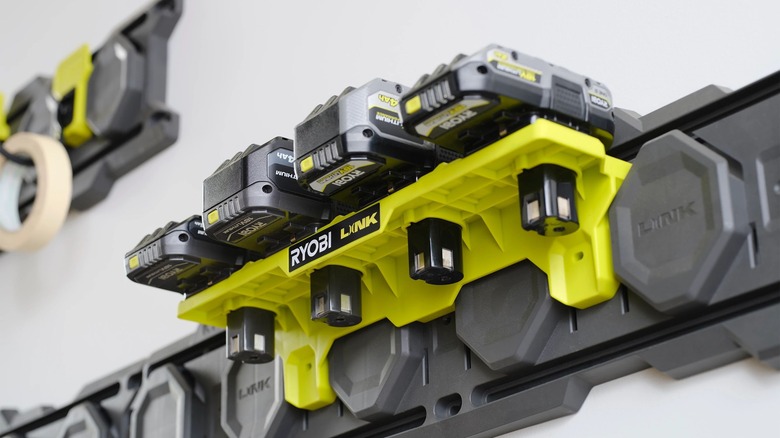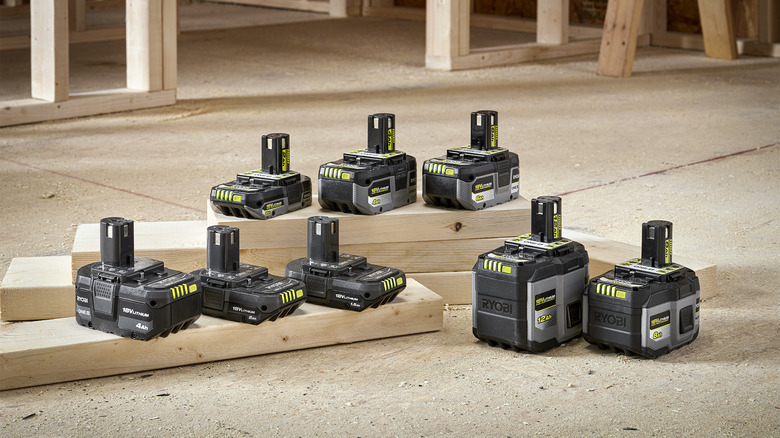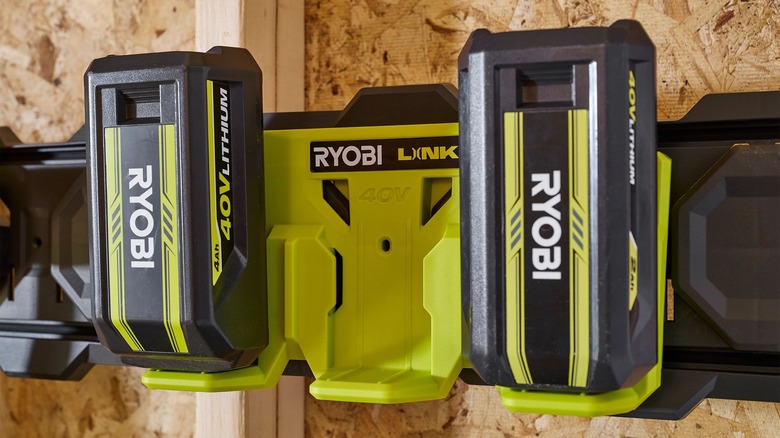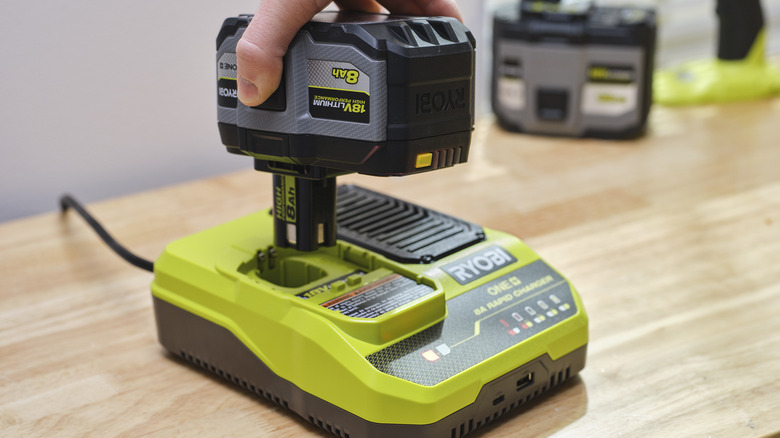How To Store Your Ryobi Batteries When They're Not In Use
If you make extensive use of tools produced by the Ryobi hardware brand, then you've probably got a decent number of assorted Ryobi battery packs kicking around your garage or workshop. Whether you're using the compact ONE+ batteries or the heavier-duty 40V packs, it's good to have a few ready for action, since the design of Ryobi's battery packs allows you to hot-swap them the moment one you're using runs out of juice. It's okay to keep your battery packs on your work table if you're going to be using them one after the other in short order. However, if you're only doing a little bit of work or are planning on taking a break for a while, that's another matter.
Ryobi batteries are built fairly tough, but they're not invulnerable. As with any lithium-ion battery, there are some potentially sensitive components and chemicals packed inside these things, and if you don't store and care for them properly, they may lose their ability to safely hold a charge. Let's go over the proper procedure for storing your Ryobi battery packs and, perhaps more importantly, the things you absolutely should not do as far as battery safety is concerned.
Inspect your battery before storage
Before you stick your Ryobi battery in storage, you should first give it a brief inspection. Ryobi tools are designed to keep small contaminants like dirt and wood shavings away from sensitive components, and they're generally pretty good at this, but it never hurts to be careful. Take a close look at the surface of your battery, including both the casing and connectors. If you see any bits of dust or debris, you can wipe them off with a clean, dry cloth, or grab a cotton swab for small nooks. This is a good opportunity to check for corrosion in the connectors. If you can catch that stuff before it takes root, you can clean it off and preserve your battery's health.
If you're sure your battery is good, the next step is to check the charge level. You want your battery pack to be charged up a little bit, just enough to keep it from going completely flat. If the battery empties completely while in storage, it'll be much harder to charge it back up. A charge of 30-50% will do just fine here. If it's close to dead, give it a quick perk up.
The right way to store your Ryobi batteries
If your battery is looking good and has a modest charge, then it's time to find a spot to stash it. The most important thing for safe battery storage is temperature regulation, as lithium-ion batteries are highly sensitive to extreme temperatures, both hot and cold. Either can damage the battery's sensitive components and warp the casing. This is why you should store it in a temperature-controlled indoor area with a consistent temperature of 50 to 77 degrees Fahrenheit. A ventilated garage connected to your home would be preferable to a standalone outdoor shed, for example. If you have a temperature-regulating storage cabinet you can stick it in, even better.
Make sure the battery has a proper shelf to sit on rather than on the floor or a dirty workbench so dust can't creep in while it's sitting. If you still have the battery's original box, storing it in there will help keep it safe. Ryobi also sells dedicated battery shelves for its ONE+ and 40V batteries that protect the connectors if you don't mind splurging a bit.
Most importantly, make sure the place you store your battery is nice and dry. Moisture is a battery's mortal enemy, as water and electricity are a dangerous mix, and even a small amount of ambient moisture can lead to contact corrosion.
The wrong way to store your Ryobi batteries
So now you know the right way to store your Ryobi batteries, but what about the wrong ways? Consider the following a comprehensive laundry list of everything you should absolutely not do unless you really enjoy replacing your Ryobi batteries on a regular basis.
First of all, never leave a Ryobi battery in direct sunlight. A room with too much ambient heat is bad enough for a battery pack, but prolonged exposure to direct sunlight will fry it like bacon. The same goes for mechanical heat sources like radiators and heating vents — the further the battery is from heat, the better. Of course, the same problem can occur if you leave it out in an uninsulated spot that is exposed to the cold, so try to find that magic middle ground.
Second, when storing your Ryobi battery, don't store it on its charging cradle or plugged into a tool. Even if you're not actively charging or using the pack, just leaving its connectors plugged into something will passively drain its charge. Don't be surprised if you grab your tool off the shelf only to find it's gone completely flat.
Finally, and this is a big one, never store battery packs anywhere near flammable substances, including fuels, solvents, or otherwise volatile chemicals. It's not fun to think about your battery spontaneously exploding, but if it's stored improperly, then that is a possibility. Do everything you can to mitigate any potential damage.



